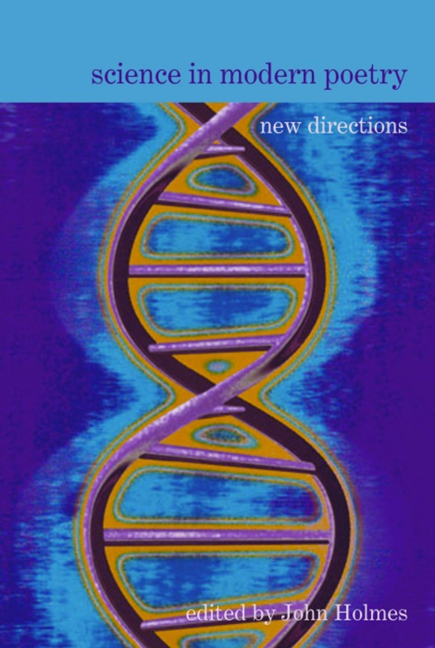Book contents
- Frontmatter
- Contents
- List of Contributors
- Acknowledgements
- Introduction
- Part I Science and Contemporary Poetry: Cross-Cultural Soundings
- 1 The Function of Antagonism: Miroslav Holub and Roald Hoffmann
- 2 Cutting and Pasting: Language Writing and Molecular Biology
- 3 The Poetics of Consilience: Edward O. Wilson and A. R. Ammons
- 4 Poetry, Science and the Contemporary University
- Part II Science in Modernist Poetry: Appropriations and Interrogations
- Part III Darwinian Dialogues: Four Modern Poets
- Afterword
- Bibliography
- Index
2 - Cutting and Pasting: Language Writing and Molecular Biology
from Part I - Science and Contemporary Poetry: Cross-Cultural Soundings
- Frontmatter
- Contents
- List of Contributors
- Acknowledgements
- Introduction
- Part I Science and Contemporary Poetry: Cross-Cultural Soundings
- 1 The Function of Antagonism: Miroslav Holub and Roald Hoffmann
- 2 Cutting and Pasting: Language Writing and Molecular Biology
- 3 The Poetics of Consilience: Edward O. Wilson and A. R. Ammons
- 4 Poetry, Science and the Contemporary University
- Part II Science in Modernist Poetry: Appropriations and Interrogations
- Part III Darwinian Dialogues: Four Modern Poets
- Afterword
- Bibliography
- Index
Summary
Exploration takes extra words
Words qua sentience and thinking
These are spread over a position – being long and pointed over
They anticipate an immoderate time and place
Reality moves around making objects appear as if they belong where they are
Then it shifts, say, up and down, with the sunlight's yellow interstitial coloring matter
The sun here is an exceeding stricture
I've yet … I keep thinking … all open daylit areas carry to peripheries their yellow floating ovoid motes
Eggs go out of optical range, but only ellipsing
This particular attraction empties in
Blown convincing field, it rattles with brown grass turning
I'm looking, prematurely, for a particular point of view – that of one who has already achieved objectivity
Objectivities and metonymies
But one can't die
Sex sexes scale and flies faithful to the ground
October 11, 1986This is the third section of Lyn Hejinian's poem sequence The Cell (1992), a series of meditations on the embodied self, partly inspired by the pragmatism of William James and the philosophical observations of everyday landscapes in Henry David Thoreau's writings, partly by a commitment to avant-garde proceduralism, and partly by interest in the principles of scientific research. Tacit allusions to science are everywhere: in references to methodology (exploration, objectivity); in technical vocabulary (sentience, interstitial, ovoid, optical); and in the style, which emulates the self-correcting precision based on repeated observation typical of reports of scientific research. This evidence might appear to support the interpretation that this is a poem of quasi-scientific inquiry. And yet not only is it a poem and therefore an inappropriate mode of writing for scientific research, what is worse is that this poem does not even offer us the usual solidities of a normative poem. It has very little punctuation and its syntax is sometimes unresolved, its paratactic sentences are often sharply disjunctive, there is no narrative or scene setting for its meditations, and though we can gain glimpses of an argument, it is not sustained and nor are its components obviously affirmed. We therefore cannot easily attribute to the poem or the author any specific engagement with the sciences.
- Type
- Chapter
- Information
- Science in Modern PoetryNew Directions, pp. 38 - 54Publisher: Liverpool University PressPrint publication year: 2012



